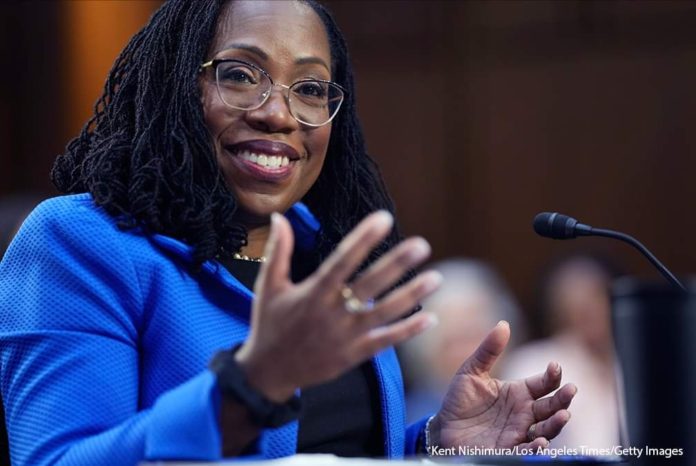The Senate voted to confirm Judge Ketanji Brown Jackson to the Supreme Court on Thursday, cementing her place in history as the first Black woman to serve on the nation’s highest court.
Jackson’s confirmation as the 116th justice in U.S. history received bipartisan backing, with a final vote of 53 to 47 in the upper chamber.
Three Republicans, Sens. Susan Collins of Maine, Lisa Murkowski of Alaska and Mitt Romney of Utah, joined all 50 Democrats in supporting President Biden’s nominee. Vice President Kamala Harris, the first woman and first woman of color to hold the role, presided over the Senate during the vote.
“On this vote, the yays are 53. The nays are 47 and this nomination is confirmed,” Harris said to rousing applause from senators.
Jackson’s appointment to the high court is likely to be a significant component of Mr. Biden’s legacy, and marked his first opportunity to make his imprint on the Supreme Court. But Jackson will not take the bench immediately, as Justice Stephen Breyer, whose seat she will fill, is poised to retire at the end of the Supreme Court’s term this summer.
Mr. Biden watched the vote with Jackson in the Roosevelt Room at the White House. Photographers capture the two embracing as the Senate passed the threshold needed for her confirmation.
President Biden goes to hug Supreme Court nominee Judge Ketanji Brown Jackson as they watch the Senate votes.
“This is a wonderful day, a joyous day, an inspiring day for the Senate, for the Supreme Court and for the United States of America,” Senate Majority Leader Chuck Schumer said before the vote. “Today is one of the brightest lights, and let us hope it’s a metaphor, an indication of many more bright lights to come.”
Approval of Jackson’s nomination by the evenly divided Senate capped a confirmation process that was marked by Republican attempts to paint her as a soft-on-crime activist judge who would legislate from the bench.
Their criticisms, which were rooted in Jackson’s sentencing record in child pornography cases while she was a federal trial court judge, failed to derail efforts from the White House and Democratic Senate leaders to drum up bipartisan support for Jackson’s nomination, piercing the partisan polarization of recent Supreme Court confirmation. But the accusations did provide Republicans with fodder as they position themselves as the law-and-order party ahead of the November midterm elections.
Senate leaders moved swiftly to begin the confirmation process after Mr. Biden, a former chairman of the Senate Judiciary Committee, announced Jackson as his pick for the Supreme Court in late February. With his selection of Jackson, Mr. Biden fulfilled his pledge from the 2020 presidential campaign to nominate the first Black woman to the high court.
During confirmation hearings that spanned four days in March, Jackson endured nearly 24 hours of questioning from the 22 members of the Senate Judiciary Committee, after which the panel deadlocked on approving her nomination along party lines Monday.
The tie 11-11 vote in the Judiciary Committee forced a procedural vote in the full Senate to advance Jackson’s nomination. While the upper chamber voted to move Jackson’s nomination out of the committee, with three Republicans joining Democrats in the vote, the effort underscored how bitterly partisan recent confirmation fights have become and the near-unified GOP opposition to her appointment.
Ahead of the vote, Murkowski said in a statement announcing her support for Jackson that her decision rested in part on her rejection “of the corrosive politicization of the review process for Supreme Court nominees, which, on both sides of the aisle, is growing worse and more detached from reality by the year.”
Jackson will join the Supreme Court after serving for nearly a year on the U.S. Court of Appeals for the District of Columbia Circuit, considered the nation’s second most powerful court. In her first term on the high court, Jackson will hear a pair of cases involving admissions policies at Harvard College and the University of North Carolina, as well as redistricting and religious liberty disputes.
Jackson has pledged to recuse herself from the Harvard legal fight, as she is a member of the school’s Board of Overseers, one of its two governing bodies.
Reporting by NBC News






















